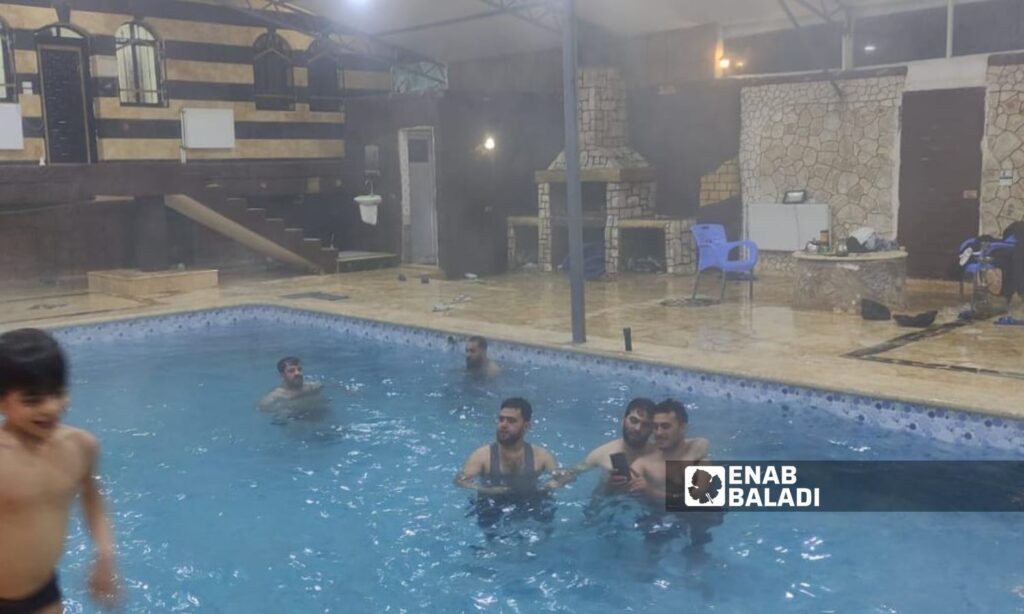Winter pools have spread in Idlib province, providing services such as bathing, relaxation sessions, and youth gatherings, along with facilities for water heating.
The relatively calm situation in the area has encouraged dozens of investment projects; however, the high cost of services offered by these pools has made them inaccessible to many locals.
Mohammed al-Homsi launched this service in the city of al-Dana through a pool he opened in the winter of 2022, which operates on private reservations.
Reservation fees vary between day and night and holiday periods, with daytime reservations usually costing $40 US for 6 hours, while nighttime reservations range between $50 and $60, according to al-Homsi. He explained to Enab Baladi that the pool allows visitors to book only two consecutive hours to accommodate the high cost.
The pool also offers month-long reservations, where customers can stay at the pool like they would in their own homes.
Al-Homsi, the pool owner, said the project is witnessing notable demand, and most visitors decide to repeat the experience because of its exceptional services and tranquil sessions.
For his part, Ahmad Haj Hamdan, owner of al-Na’im pool in the city of Binnish, transformed his pool to offer winter services at the end of 2023, by roofing it and installing a water heating device.
Hamdan explained that he equipped the pool with a sitting lounge, water baths, changing rooms, and a kitchen with its accessories, creating a warm atmosphere that allows visitors freedom of movement despite the cold weather.
Hamdan explained that he set entrance fees to the pool to cover only the cost of service due to low turnout; it’s $2 per person for a period ranging between one and three hours. As for private closed group or family reservations, the cost per hour during the daytime is eight dollars and ten dollars at night.
Boiler for heating water
A boiler is used to heat the pool water, a device imported from Turkey that heats water using coal fuel through a heat exchange process between the pool water and the hot water pumped from the device, controlled via a digital screen, as explained by Mohammed al-Homsi.
The boiler requires about 20 kilograms of coal per hour to maintain the water temperature. For initially heating the water, which allows for the replacement and cleaning of the pool waters, the consumption ranges from 400 to 500 kg of coal over six to nine hours.
Enjoyable times with soap scents
Customers seek out the hot baths and pools as a form of entertainment, where friends can gather away from the burdens of life, in an atmosphere saturated with the scent of laurel soap and warm water steam.
Adnan al-Mohammed (33 years) from the town of al-Dana in rural Idlib, believes that the spread of leisure projects, including winter pools, provides a comforting impression amid the atmosphere of war. He explained that he visited the pool once and enjoyed the ambiance but cannot afford to repeat the experience due to high costs.
Majid Awad (29 years), residing in Idlib, said the cost is low compared to other services and that winter sessions in a hot bath are irreplaceable.
Awad visits the pool monthly with a group of friends. “We book the pool for two or three hours and gather the largest number of youths possible to reduce the cost per individual,” said the young man.
The fees for pools in Idlib are not low when compared to workers’ wages, which range between 60 and 100 Turkish liras per day (about three dollars), and vary depending on the number of working hours and the nature of the job.
Although water in Idlib has issues such as reduced pumping hours and some areas’ dependence on tanker water (the cost of ten barrels is about $3.5, or 100 Turkish liras), home water heating is accessible to a large segment of the population. Several methods are used, including electricity, gas, and diesel, at a reasonable cost that does not exceed $1 for 200 liters of hot water.
Wood or any combustible materials, such as plastic and nylon, can also be used to provide hot water in household baths at a low cost.

